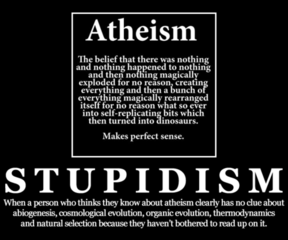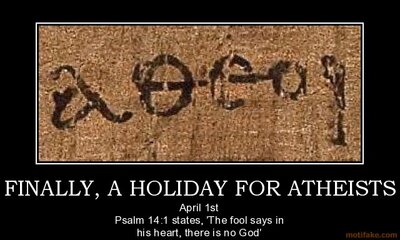Deism and Atheism
by Peter Murphy
The question that arises about nature is: is it a creation, eternal to nature, or an accident within nature. The Deist will maintain that it is a creation, but Deists will differ as to degree of involvement on the part of the Creator in the process. The atheist will counter that it is either eternal, or accidental. The final resolution of this problem will eventually be up to science to settle.
To begin, let us look at nature as an ever changing and shifting painting. Science attempts to understand what the paint and canvass is composed of, the relationship of the individual paints, and the brushstrokes that are involved in the final product. But, what about the painter? If one admits that nature is similar to a painting, than it is not too far a leap to conclude that a painter exists, or at least existed at one time.
The atheist continually resorts to the logical fallacy known as argumentum ad verecundiam (appeal to modesty) when dealing with Deists or even theists. The appeal here is to science as an authority which cannot be challenged. Unfortunately, this appeal is plagued by its own problems.
First of all, science makes no claims about God one way or another, so it is not the scientists who are for the most part claiming God does not exist on the grounds that there is a lack of evidence, but the scientific layman asserting it.
Second, science for all its great accomplishments is still in the infant stage, there is much about nature it simply does not know, even on this planet. So to conclude that a discipline, which has limitations here and now, somehow can conclude that something beyond its immediate ability to study is the final word, is logically speaking, a fallacy.
Science itself is somewhat bias as well. It suffers from nearsightedness; what it cannot observe directly or indirectly, it ignores. Things like memory may have a basis in biology, but is it safe to conclude that only biology is at work here? No one has ever seen an emotion, or a memory; yet they exist. So it is not far-fetched to conclude that there is more to nature than what we observe in our own limited corner of it. Science has only touched the tip of the scientific iceberg -- as such, science cannot be used to dismiss the idea that a God may exist. If one cannot truly understand a grain of sand, then one cannot understand the beach.
So where does the Deist stand? The Deist recognizes the limitations of belief; but still possesses the courage to believe. The belief in God in no more illogical than the belief in Extraterrestrial life forms. Nevertheless, despite the present lack of evidence for E.T. life forms, few scientists would outright dismiss them. If one accepts that E.T. life forms may exist, then one must conclude that such life forms could be far superior to us in knowledge and power -- if so, then God is in a sense, could be regarded as an E.T. life form as well. Or more accurately an Extradimensional life form. Such a being, or beings, cannot be dismissed as impossibilities.
The atheist demands that the Deist, or theist, provide evidence for the existence of God. They continually resort to logical fallacies of their own, for example, a common one is the Petitio principii (begging the question) fallacy; it goes something like this: there is no God because we find no evidence of God in nature. But is this true? No. We presently do not know enough about nature to make such a conclusion, eventually, the possibility that there is a God could be proven. The atheist has no evidence that the universe is eternal or accidental; they are assuming that scientific speculation somehow equals scientific fact. Obviously there is a great gap between speculation and fact to the rational mind.
We have the painting, but to dismiss that there is a painter is illogical, unless there is evidence that it is either an eternal painting or an accident. So far all science has offered is speculation based on drawing inferences from the available data [which is far from complete]; nevertheless, since the evidence is not complete, nor fully understood, sweeping generalizations by atheist on what exists and does not exist are groundless.
Atheists like to shift the burden of proof from themselves to their debating opponents; in short, the believer in God must prove God, but the atheist will not defend his position that the universe is either eternal or accidental. Often this tactic works, the believer will then try to make an argument for God, only to have the atheist demand that the believer first define God in some clear manner. Once the believer makes this mistake, he loses the debate. We are still in the process of understanding the painting, so trying to define the painter is doomed to failure; the believer must recognize this tactic and avoid it. Deists should feel free to openly state that there is absolutely no evidence against a Creator being, or a Creation, and that all skeptics have to offer is scientific speculation on very limited data. Deists believe there is something more; that is not unreasonable, it is very much human and rational. That "more" is God. Deists are willing to wait for the answer and are keeping an open mind on the matter; it is the atheists, who fear waiting. Simply put there is no evidence against God, nor is there evidence against a Creation [design]. The burden of proof does not lie on the open mind, but on the closed dogmatic mind which assumes that we already know all there is to know.







